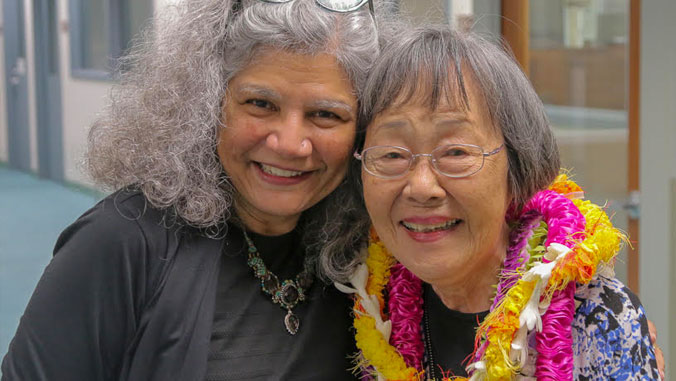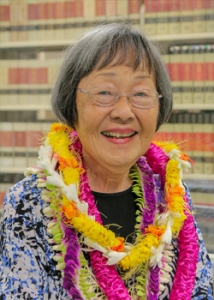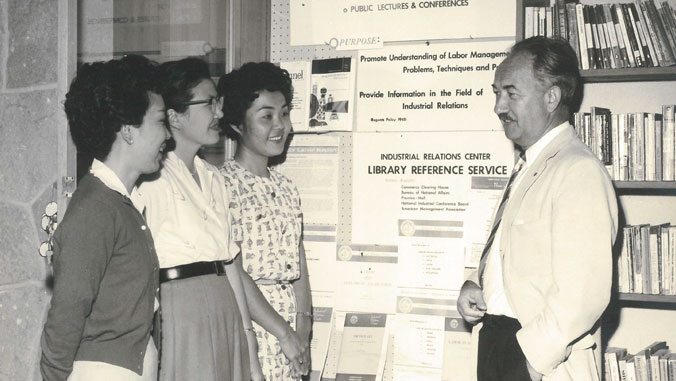
Retirement is a time for reflection, packing up personal things from the office and saying goodbye. For Joyce Najita, it’s a time to reminisce and thank the many colleagues to whom she feels indebted. This summer, after 60 years of employment at the University of Hawaiʻi at Mānoa, Najita retired as director of the UH Industrial Relations Center (IRC).
IRC was created in 1948 to promote the understanding of collective bargaining and the agreed-upon determination of wages, hours, benefits and working conditions by labor and management.
“My last week of work was filled with lei, lunches, messages and recollections of past meetings with my many friends and colleagues, both within and outside the university,” said Najita, 87. “The fond memories of the work we did together throughout my tenure will remain with me long after I leave campus.”
A check with UH human resources shows no other UH employee with 60 years of employment (64, if you count her years as a graduate assistant). In fact, Najita may be among the longest serving state employees.

“Joyce is respected and well-known among local labor organizations and throughout the UH community,” says Monica Ghosh, the interim university librarian who oversees the IRC. “She has tremendous knowledge and expertise on labor history and decisions during a critical period of the state. She will be missed, both professionally and personally.”
A historic perspective
Najita is the youngest of four children of an immigrant father from Japan and a Maui-born mother who operated a laundry shop on Kinau Street in Makiki. After graduating from Roosevelt High School in 1950, she enrolled at UH Mānoa to study business administration.
Najita recalls the Mānoa campus in the 1950s was “basically Varney Circle and Hawaiʻi Hall, bordered by Dean Hall, Gartley Hall, Crawford Hall and George Hall, which was the UH library at the time. There was also Hemenway Hall, Miller Hall, the UH swimming pool and a barracks-style snack bar. Farrington Hall, where the Queen Liliʻuokalani Building now stands, was the largest lecture hall.”
In 1954, after obtaining her bachelor’s degree, she traveled to Cambridge, Massachusetts, to earn her management certificate at Radcliffe College, the sister school to Harvard, which did not admit women. Najita returned to UH as a graduate assistant for Harold S. Roberts, IRC founder and first dean of the College of Business Administration.
Najita’s first task was to organize the IRC library. She also prepared news materials for inclusion in the monthly IR Newsletter and researched collective bargaining issues, including arbitration decisions and labor union security. “The early years were fairly quiet,” she said, “until the Vietnam era in the 1960s with anti-war student demonstrations at Bachman Hall, the Oliver Lee case (in which an activist political science professor’s promise of tenure was withdrawn) and the ensuing resignation of UH President Thomas Hamilton.”
In 1970, Roberts passed away and was replaced as IRC director by John Ferguson. When Ferguson retired in 1978, Chancellor Wytze Gorter named Najita as director, a position she held for 40 years.
Since well-known legal arbitrators like Ted Tsukiyama, and lawyers such as management attorneys Cary Moore and Richard Rand and labor counsel Herb Takahashi and Sean Kim, would often come to IRC to do research, Najita evolved into becoming an arbitrator herself, a rare feat for a non-attorney. She presided over more than 250 cases, including the 10-day suspension of some 200 principals and vice principals during the 1979 UPW strike against the public schools. She was also instrumental in developing the Hawaiʻi Interest Arbitration Law, which first extended arbitration rights to unionized firefighters and then to other bargaining units, including the HGEA.
Najita especially enjoyed playing the role of sleuth while working with storied labor arbitrator Tsukiyama, whose decisions changed the face of local employment law by setting the standard for the just-cause principle. She remembers, for example, how he reinstated the job of an aging telephone operator nearing retirement age who was discharged for declining performance. In that decision, Tsukiyama cited the example of an old horse being sent to the glue factory, noting the inequity given her long and loyal years of employment.
Future focus
How valuable is Najita’s experience and institutional memory? With her official retirement, plans are to close IRC and incorporate its publications onto other shelves at Hamilton Library. Najita expects to keep in touch with friends and former colleagues while continuing her longtime research project about the workplace, hoping to answer such questions as “What will jobs be like in the future?” and “Will women, in particular, be replaced by machines?”
While her position and office are no more, Najita’s love for researching employment issues continues on with her research project. “We know we are witnessing a technological revolution in which change is occurring at an ever accelerating pace. It is hard to know how the organizations of today will function as technology changes,” she said. “The change is really going to remake a lot of the world as we know it. I hope to be around when that happens.”


